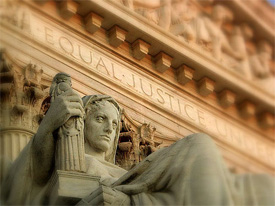Obama Recess Appointments Slapped Down by DC Circuit, CFPB At Risk
 What can only be described as a blockbuster opinion was just handed down by the DC Circuit in the case of Canning v NLRB, the validity of President Obama’s recess appointments has been slapped down. Here is the full opinion. The three judge panel was Chief Judge David Sentelle, Karen Henderson and Thomas Griffith, all Republican appointees (one from each Bush and one Reagan).
What can only be described as a blockbuster opinion was just handed down by the DC Circuit in the case of Canning v NLRB, the validity of President Obama’s recess appointments has been slapped down. Here is the full opinion. The three judge panel was Chief Judge David Sentelle, Karen Henderson and Thomas Griffith, all Republican appointees (one from each Bush and one Reagan).
The immediate effect of the court’s decision is, of course, on the National Labor Relations Board (NLRB). Noel Canning was aggrieved by a decision of the NLRB and petitioned for review, the NLRB cross-petitioned to have its decision upheld. Fairly standard stuff – except the quorum on the NLRB Board was met only because of the fact Barack Obama controversially recess appointed three members in January 2012, as well as concurrently recess appointing Richard Cordray to be the Director of the Consumer Finance Protection Bureau. So, three out of the five members of the NLRB Board were, according to Canning’s argument, not validly sitting and therefore their decision was invalid as to him
Canning had merits arguments on the specific facts of his individual case, but the court found those non-compelling and proceeded on the Constitutional arguments surrounding the validity of the recess appointments. And the Court agreed with Canning that Obama’s recess appointments were invalid. The discussion by the court can be gleaned from these passages:
All this points to the inescapable conclusion that the Framers intended something specific by the term “the Recess,” and that it was something different than a generic break in proceedings.
….
It is universally accepted that “Session” here refers to the usually two or sometimes three sessions per Congress. Therefore, “the Recess” should be taken to mean only times when the Senate is not in one of those sessions. Cf. Virginia v. Tennessee, 148 U.S. 503, 519 (1893) (interpreting terms “by reference to associated words”). Confirming this reciprocal meaning, the First Congress passed a compensation bill that provided the Senate’s engrossing clerk “two dollars per day during the session, with the like compensation to such clerk while he shall be necessarily employed in the recess.” Act of Sept. 22, 1789, ch. 17, § 4, 1 Stat. 70, 71.Not only logic and language, but also constitutional history supports the interpretation advanced by Noel Canning, not that of the Board. When the Federalist Papers spoke of recess appointments, they referred to those commissions as expiring “at the end of the ensuing session.” The Federalist No. 67, at 408 (Clinton Rossiter ed., 2003). For there to be an “ensuing session,” it seems likely to the point of near certainty that recess appointments were being made at a time when the Senate was not in session — that is, when it was in “the Recess.” Thus, background documents to the Constitution, in addition to the language itself, suggest that “the Recess” refers to the period between sessions that would end with the ensuing session of the Senate.
….
The Constitution’s overall appointments structure provides additional confirmation of the intersession interpretation. The Framers emphasized that the recess appointment power served only as a stopgap for times when the Senate was unable to provide advice and consent. Hamilton wrote in Federalist No. 67 that advice and consent “declares the general mode of appointing officers of the United States,” while the Recess Appointments Clause serves as “nothing more than a supplement to the other for the purpose of establishing an auxiliary method of appointment, in cases to which the general method was inadequate.” The Federalist No. 67, supra, at 408. The “general mode” of participation of the Senate through advice and consent served an important function: “It would be an excellent check upon a spirit of favoritism in the President, and would tend greatly to prevent the appointment of unfit characters from State prejudice, from family connection, from personal attachment, or from a view to popularity.” The Federalist No. 76, supra, at 456.
Then the blow was delivered: Read more →


